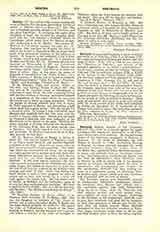

Berthold, Bishop, Apostle of the Livonians, killed July 24, 1198, in a crusade against the pagan Livonians who threatened destruction to all Christians that lived in their territory. He was previously Abbot of the. Cistercian monastery of Lockum in Hanover. At the death of Meinhard, the first Bishop of Livonia (c. 1196), Archbishop Hartwig of Bremen, to whose province belonged the newly converted countries along the eastern shores of the Baltic Sea, appointed Abbot Berthold successor. It seems very probable that, as Damberger asserts in his “Synchronistische Geschichte der Kirche and der Welt im Mittelalter”, when Meinhard came to Bremen in 1186 to obtain help in his apostolic labors in Livonia, Berthold joined the band of missionaries who accompanied him thither. On this assumption, Berthold had been working ten years as a missionary among the Livonians when he became their second bishop and was, therefore, well acquainted with his field of labor.
The Livonian pagans were fanatically opposed to Christianity. Berthold’s predecessor, assisted by merchants from Bremen and Lubeck and a few converted natives, had built fortifications along the River Duna, where the Christians held their religious services and could protect themselves against the fury of the pagans. Following in the footsteps of his predecessor, Berthold tried to gain their confidence and good will by kindness. At first they appeared to become less hostile, but soon their old hatred revived. When Berthold attempted to bless the Christian cemetery at Holm, their pagan fanaticism broke loose in all its fury and they decided either to burn the bishop together with his church at Holm or to drown him in the Duna. The Christians fled to their strongholds at Uxkull and Holm, while the bishop escaped in a ship to Lubeck.
Pope Celestine III, shortly before his death, was preparing to send a fleet of crusaders to protect the Christians of the Baltic Provinces, and his successor, Innocent III, continued the work. Berthold gained the financial assistance of Archbishop Hartwig and many merchants of Bremen and Lubeck. In a short time a large fleet was ready for departure well equipped and loaded with crusaders and many German peasants who were to settle permanently in Livonia. It put to sea at Lubeck and crossed the Baltic, entering the River Duna from what is now called the Gulf of Riga. Near the mouth of the Duna the German peasants landed with the purpose of making their homes in the vicinity, and laid the foundations of the city Riga, at present one of the most important commercial seaports in Russia. Berthold, accompanied by the crusaders, sailed up the river as far as Holm, where the pagan Livonians had gathered with the intention of attacking the fleet. Having vainly attempted to come to a peaceful agreement with them, Berthold and his companions sailed some distance down the river, with the Livonians in eager pursuit. Finally, the pagans agreed to a suspension of hostilities to gain time for collecting larger forces. At the first opportunity, however, they fell upon the Christians who ventured outside their fortifications, and hostilities were resumed. The crusaders were victorious, but Berthold’s horse became intractable and galloped into the midst of the fleeing Livonians. A pagan by the name of Ymant thrust his lance into Berthold’s back, inflicting a wound that caused speedy death. The bishop’s body was buried by the crusaders at Uxkull whence it was transferred to Riga by Bishop Albert of Apeldern whom Archbishop Hartwig of Bremen had appointed Berthold’s successor. Soon after the death of Berthold many of the vanquished pagans came to the crusaders, expressing their regret at the unhappy occurrence and asked to be baptized. The final conversion of Livonia was effected by Bishop Albert, who was assisted in his apostolic labors by the newly founded Order of the Brothers of the Sword which in 1237 was affiliated with the Teutonic Order.
MICHAEL OTT

